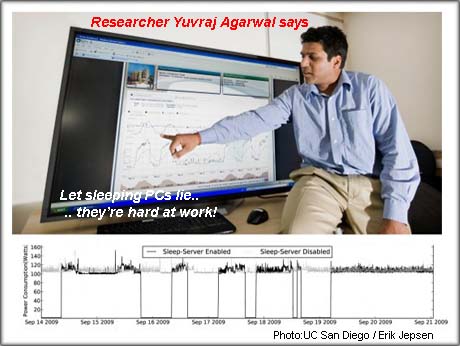
An Indian-American scientist at the University of California, San Diego, has led to success, a project that allows personal computers in sleep mode to still respond to applications like Internet telephony, instant messaging and peer to peer computing.
The software called SleepServer is able to reduce energy consumption on enterprise PCs previously running 24/7 by an average of 60 percent. To do this the application creates “lightweight virtual images of sleeping PCs” that maintain connectivity and respond to applications while still in a “sleep-working” state. The virtual PC image mimics the physical PC on the server, responding to network events.Using SleepServer does not require any hardware additions to the end hosts themselves, and can be supported purely by additional software running on the systems under management.
Says Yuvraj Agarwal, Research Scientist in the Department of Computer Science and Engineering the UC San Diego, who led the SleepServer development: ”Our goal with SleepServer is to help buildings with heavy IT-loads reach net-zero energy use, so that these buildings effectively become carbon neutral by generating as much renewable energy as they consume.” Over 50 computers use the solution at theUC, San Diego's computer science building, and Dr Agarwal says he has "seen an almost 70 per cent energy savings on my PC over the last six months."
Dr Agarwal is a B.E. in Electrical Engineering from the University of Pune . He grew up in Kanpur where he did most of his schooling (upto Grade 12). He obtained a Ph.D. in Computer Science and Engineering in September 2009 from the University of California, San Diego
Link to detailed report in Gizmag, with more photos: http://www.gizmag.com/computer-sleep-mode-active-server-software/15539/
Link to original paper in PDF format presented at the USENIX ATC '10 conference in Boston, June 24 2010 : SleepServers: A Software-Only Approach for Reducing the Energy Consumption of PCs within Enterprise Environments Yuvraj Agarwal, Stefan Savage and Rajesh Gupta. Proceedings of the USENIX Annual Technical Conference (USENIX ATC '10), June 2010. http://mesl.ucsd.edu/yuvraj/research/documents/Agarwal-Usenix10-SleepServers.pdf
June 27 2010